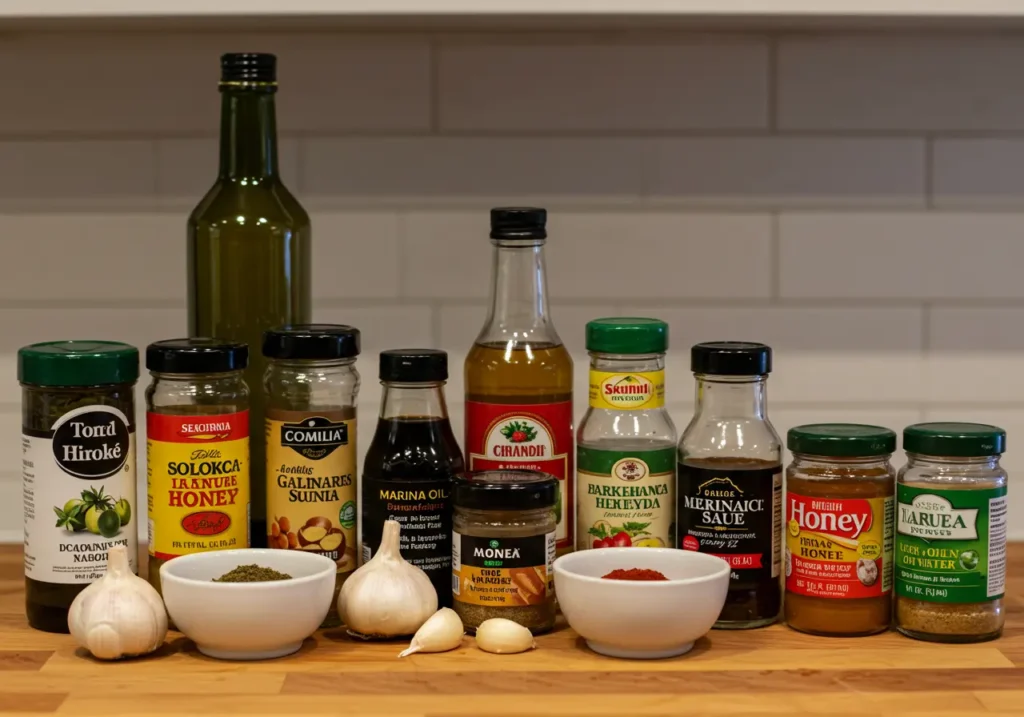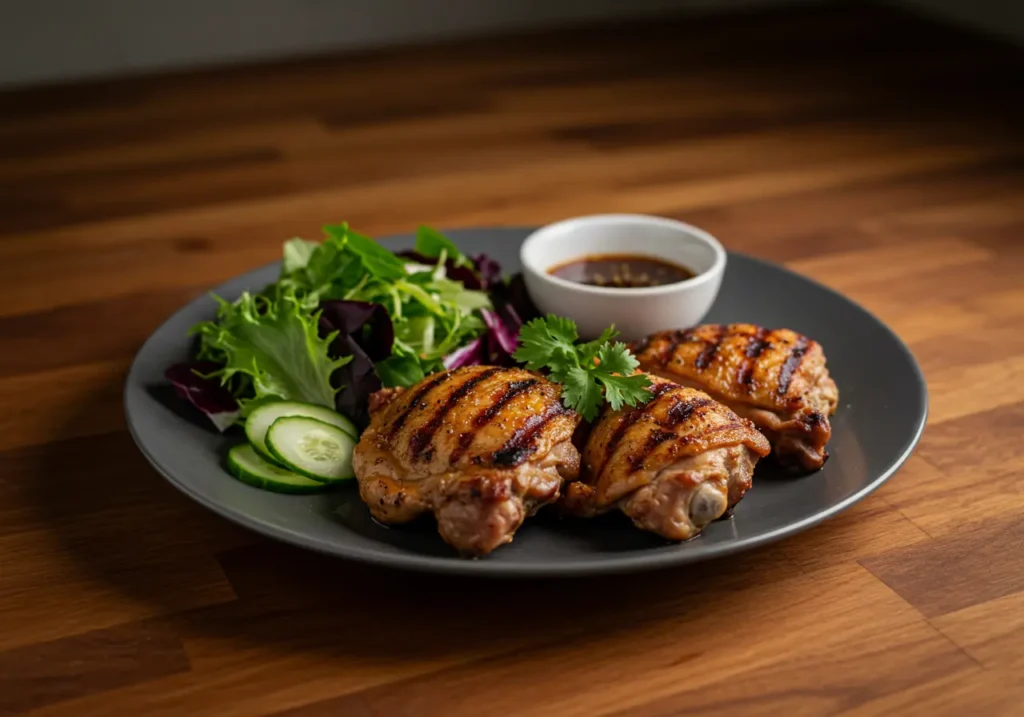How long can you marinate chicken before grilling? Have you ever wondered, “How long can I marinate chicken before grilling it?” It’s a common question, especially for anyone who loves juicy, flavorful grilled chicken. The answer isn’t as simple as you’d think—it depends on a lot of factors. Stick around, and I’ll walk you through everything you need to know about marinating chicken, including the dos, the don’ts, and some helpful tips. 🍗🔥
Table of Contents
What Is Marination and Why Is It Important?
Marination is like giving your chicken a flavor bath. When you marinate chicken before grilling, you’re not just adding bold flavors—you’re also tenderizing the meat for the perfect texture. By soaking chicken in a mixture of herbs, spices, and liquids, you allow it to absorb those wonderful flavors deeply. Ingredients like yogurt or lemon juice break down proteins, making your chicken softer and juicier. Think of it as giving your chicken a luxurious spa day! 🛁

The Role of Marination in Grilling Chicken
Marinate chicken before grilling to achieve both incredible flavor and perfect texture. When grilled, the sugars in marinades caramelize, creating a golden crust that’s packed with flavor, while the oils prevent the chicken from sticking to the grill. This simple step is essential for juicy, tender chicken that stands out at any meal. By understanding the benefits of marinating chicken before grilling, you can turn this process into a game-changer for your cooking, ensuring every bite is as delicious as it is satisfying.
Factors That Determine How Long You Can Marinate Chicken Before Grilling
Not all marinades are created equal, and not all chickens need the same marination time. Here’s a breakdown of the key factors that affect how long you can marinate chicken before grilling.
Type of Marinade: Acidic vs. Non-Acidic
How long can you marinate chicken before grilling? It all begins with the type of marinade you choose. Is it acidic (like vinegar, citrus juice, or yogurt) or non-acidic (like oil, soy sauce, or honey)? Acidic marinades work faster because they break down the chicken’s fibers, but if you marinate chicken for too long before grilling, the texture can turn mushy. In contrast, non-acidic marinades are gentler, allowing you to marinate chicken before grilling for longer without compromising its texture. By understanding how these marinades work, you can strike the perfect balance of flavor and tenderness every time you fire up the grill.
💡 Pro Tip: For acidic marinades, aim for 2–6 hours. Non-acidic marinades can go up to 24 hours safely.
Cut of Chicken: Breast, Thigh, Wing, or Whole Chicken
How long can you marinate chicken before grilling? The cut of chicken plays a crucial role in determining the ideal marination time. Smaller pieces like wings and drumsticks soak up marinades quickly, making them perfect for shorter marination periods. Chicken breasts, however, are a bit trickier—they can dry out if you marinate chicken for too long before grilling. Thighs, in contrast, are more forgiving, allowing you to marinate chicken before grilling for extended periods without compromising their texture. Understanding how different cuts respond to marination ensures your grilled chicken is always tender, juicy, and flavorful.
Refrigerator vs. Room Temperature Marination
Temperature matters too. Always marinate chicken in the fridge—not on the counter. At room temperature, bacteria can grow, and no one wants a side of food poisoning with their grilled chicken! Keeping it chilled not only ensures safety but also allows the flavors to seep in more evenly.
Recommended Marination Times for Chicken
Now, here’s the part you’re probably waiting for: How long should you marinate chicken for optimal flavor? Let’s break it down by time and chicken cuts.
Minimum Time for Flavor Infusion
If you’re in a rush, even 30 minutes of marination can do wonders. While it won’t be as deeply flavored as longer marination, it’s still better than skipping it entirely. Use a strong marinade (like soy sauce and garlic) to pack in as much flavor as possible in a short time.
Optimal Marination Duration for Different Cuts of Chicken
Here’s a cheat sheet:
- Chicken breasts: 2–4 hours. Longer than that, and they might get too soft.
- Thighs and drumsticks: 4–12 hours. They can handle more time without any issues.
- Wings: 2–6 hours. These little guys absorb flavor quickly.
- Whole chicken: 8–24 hours. Since it’s a larger cut, it needs more time for the flavors to penetrate.
When Does Marinating Too Long Become a Problem?
Yes, there’s such a thing as too much of a good thing. Over-marinating chicken, especially in acidic marinades, can make the meat mushy and unappetizing. It’s like leaving your clothes in the washing machine for too long—they get soggy and lose their charm. Aim for the sweet spot, and don’t go overboard.
📝 Quick Reminder: Never marinate chicken for more than 48 hours, no matter what kind of marinade you use. Beyond that, the texture starts to break down in unpleasant ways.
Common Mistakes When Marinating Chicken
Marinating chicken isn’t rocket science, but there are a few pitfalls to avoid. Let’s tackle those so you can grill with confidence.
Over-Marinating: When Enough Is Too Much
As we mentioned earlier, leaving chicken in acidic marinades for too long can result in mushy meat. Nobody wants to bite into something that feels more like pudding than chicken. Stick to the recommended times.
Not Properly Balancing the Ingredients
Ever tasted chicken that was way too salty or sour? That’s what happens when you don’t balance your marinade. A good marinade has a mix of acid, fat, salt, and sweetness. Think of it as a team—each ingredient plays its part.
Skipping the Step of Properly Covering the Chicken
If your chicken isn’t fully covered in the marinade, some parts will stay bland. Always use a resealable bag or a tightly covered container to ensure every inch of the chicken gets its flavor boost.
Solutions to Marinating Problems
Mistakes happen, but don’t worry—you can fix most marination mishaps.
How to Fix Over-Marinated Chicken
If you’ve gone a little overboard, all is not lost. Rinse the chicken under cold water to remove some of the marinade. Pat it dry and season it lightly before grilling. It won’t be perfect, but it’ll still be tasty.
Creating the Perfect Marinade with a Balanced Flavor
The key to a great marinade is balance. Use the 3:1 ratio: three parts oil to one part acid. Add a pinch of salt, a hint of sweetness, and your favorite spices, and you’re good to go.
“A great marinade doesn’t overpower the chicken—it complements it. Think of it as a supporting actor, not the main star.”
Food Safety Guidelines for Marinating Chicken
When it comes to marinating chicken, flavor isn’t the only thing to think about—food safety is equally important. Mishandling raw chicken or marinade can lead to foodborne illnesses, which no one wants to deal with. Let’s explore how to keep your marinating process safe and hygienic.
Handling Chicken Safely During Marination
Chicken is a magnet for bacteria like Salmonella and Campylobacter. To avoid cross-contamination, always follow these tips:
- Wash your hands: Before and after touching raw chicken, wash your hands with soap and warm water for at least 20 seconds.
- Use separate utensils: Don’t use the same cutting board or knife for chicken and other ingredients unless they’ve been thoroughly cleaned.
- Avoid washing chicken: Rinsing raw chicken in the sink can splash bacteria onto nearby surfaces. Skip this step altogether—it’s unnecessary if you’re cooking the chicken properly.
Proper Storage Techniques to Prevent Contamination
Marinated chicken should always be stored in the refrigerator. Leaving it at room temperature for more than two hours allows bacteria to grow. Place the chicken in an airtight container or a resealable plastic bag to prevent leaks.
💡 Pro Tip: Place the container on the bottom shelf of your fridge to avoid drips contaminating other foods.
Can You Reuse Marinade? Pros and Cons
Reusing marinade can save time and ingredients, but it comes with risks. Since the marinade has been in contact with raw chicken, it’s full of harmful bacteria. However, you can reuse it safely if you bring it to a boil for at least 5 minutes. Boiling kills bacteria, turning your leftover marinade into a safe sauce or basting liquid.
🚫 Never use raw marinade on cooked chicken.
Enhancing the Marination Process
You’ve got the basics down, but let’s kick it up a notch. There are some techniques and tips that can take your marinating game to the next level (no fancy words here, I promise).
Tips for Getting the Most Flavor Out of Your Marinade
Want maximum flavor? Try these:
- Pierce the chicken: Use a fork to poke small holes in the chicken. This allows the marinade to seep deeper into the meat.
- Massage the chicken: Give the marinade a helping hand by massaging it into the chicken. Think of it as a mini workout for your hands.
- Use fresh ingredients: Fresh garlic, ginger, and herbs pack more punch than their powdered counterparts.
Using Vacuum-Sealed Bags for Faster Marination
Vacuum-sealing isn’t just for food storage—it works wonders for marination too! By removing air, vacuum-sealed bags create pressure, forcing the marinade into the chicken. It’s like a flavor shortcut, cutting down marination time without sacrificing taste.
💡 Did You Know? You can achieve a similar effect by squeezing out as much air as possible from a regular resealable bag before sealing it.
Alternative Methods: Dry Rubs vs. Wet Marinades
Not a fan of wet marinades? Try a dry rub instead. While wet marinades penetrate the chicken, dry rubs sit on the surface, forming a flavorful crust when grilled. The best part? Dry rubs don’t require hours of marination—30 minutes is often enough to make a big difference.
📝 Quick Comparison:
- Wet Marinades: Better for tenderizing and infusing flavor.
- Dry Rubs: Faster, easier, and perfect for a crisp outer layer.
Frequently Asked Questions About Marinating Chicken
Still have questions? Let’s tackle some of the most common ones people ask about marinating chicken.
Can You Marinate Chicken Overnight?
Absolutely! In most cases, marinating chicken overnight is ideal for deep, rich flavors. Just remember to follow the recommended times for specific cuts:
Small pieces like wings or drumsticks: 6–12 hours max.
Larger cuts or whole chicken: 12–24 hours.
🔔 Reminder: If your marinade contains a lot of acid, stick to the lower end of these ranges.
Is It Safe to Marinate Chicken for 48 Hours?
Yes and no. While it’s technically safe to marinate chicken for up to 48 hours if refrigerated, the texture might suffer. Beyond 24 hours, the chicken can become too soft, especially in acidic marinades. If you need to prep ahead, consider freezing the marinated chicken instead.
How Long Should You Let Chicken Rest After Marination?
Before grilling, let the marinated chicken rest at room temperature for 20–30 minutes. This ensures even cooking. Cold chicken straight from the fridge can cook unevenly, leaving you with dry or undercooked spots.
💡 Pro Tip: Always cover the chicken during this resting period to prevent contamination.
“Marinating is all about balance—get it right, and you’ll never go back to plain grilled chicken.”
Advanced Tips for Perfectly Marinated and Grilled Chicken
Let’s dive into some high-level tricks that go beyond the basics. To ensure every piece of chicken you grill turns out spectacular, it’s essential to marinate chicken before grilling. This simple step not only boosts flavor but also guarantees tender, juicy meat that’s perfect for a family barbecue or a weekend feast with friends. With the right techniques and a balanced marinade, your grilled chicken can go from ordinary to extraordinary.
Pairing Marinades With Cooking Methods
Different cooking methods work best with certain types of marinades. Here’s how to match them like a pro:
- Grilling: Use marinades with a touch of sugar or honey to get that irresistible caramelized crust.
- Oven Roasting: Thicker marinades (like yogurt-based ones) work well, creating a rich outer layer.
- Air Frying: Oil-heavy marinades keep the chicken moist and prevent it from drying out.
- Pan-Seared: Opt for quick marinades with bold flavors like soy sauce and garlic for a punchy, crispy finish.
Adding a Smoky Twist Without a Grill
No grill? No problem! You can replicate smoky flavors in several ways:
- Add smoked paprika or liquid smoke to your marinade.
- Use a cast-iron pan to sear the chicken and finish it in the oven for a similar charred effect.
- Try wood chips in an oven-safe tray to infuse your kitchen-cooked chicken with smoky goodness.
Marinating Beyond Flavor: Nutritional Benefits
Did you know that when you marinate chicken before grilling, you’re not just adding flavor—you’re also boosting its nutritional value? Ingredients like olive oil, garlic, turmeric, and ginger bring anti-inflammatory and antioxidant properties to your marinade. This means your grilled chicken isn’t just delicious; it’s also packed with health benefits. Marinating is a simple way to turn your meal into something that’s both tasty and good for you.
💡 Pro Tip: Add fresh herbs like parsley or cilantro to your marinade just before serving for an extra health kick and a burst of freshness.
Creative Marinade Variations to Try
Bored of the same old flavors? Spice things up with these unique marinades that are guaranteed to wow your taste buds.

Tropical Pineapple Coconut Marinade 🌴
Transport yourself to the tropics with this sweet and tangy blend:
- 1/2 cup coconut milk
- 1/4 cup pineapple juice
- 1 tablespoon soy sauce
- 1 teaspoon grated ginger
This marinade is perfect for grilling and pairs beautifully with grilled veggies or rice.
Zesty Orange Chili Marinade 🌶️
For a sweet and spicy twist, combine:
- Juice of 2 oranges
- 1 tablespoon chili flakes
- 2 tablespoons honey
- A pinch of salt and pepper
Let the chicken marinate for 4–6 hours, and you’ll end up with a tangy, spicy masterpiece.
Mediterranean Garlic and Basil Marinade 🌿
This recipe delivers classic Mediterranean flavors:
- 1/4 cup olive oil
- 3 minced garlic cloves
- 2 tablespoons chopped fresh basil
- Juice of 1 lemon
It’s light, fresh, and perfect for summer grilling.
Making the Most of Leftover Marinades
Once you’ve cooked your marinated chicken, you might be left wondering what to do with the extra marinade. Instead of tossing it, repurpose it safely!
Turning Marinade Into Sauce
As mentioned earlier, boiling leftover marinade kills bacteria, making it safe to use. Once boiled, it can be:
- A flavorful drizzle over grilled chicken.
- A dipping sauce for side dishes.
- A base for soups or stews.
Using Marinade for Veggies
Marinate chicken before grilling, and don’t forget to include veggies like zucchini, mushrooms, or bell peppers for a cohesive flavor profile. The marinade infuses both the chicken and vegetables with the same delicious flavors, creating a perfectly balanced meal. These marinated veggies are not just side dishes—they’re the ideal companions to complement your grilled chicken.
Transforming Grilled Chicken Into Crowd-Pleasing Dishes
Marinated grilled chicken isn’t just a standalone dish. Use it as a base to create other flavorful meals:
Grilled Chicken Tacos 🌮
Slice your marinated chicken and load it into warm tortillas. Add toppings like pico de gallo, guacamole, and a squeeze of lime. It’s a fiesta in every bite!
Chicken Salad With a Twist 🥗
Cube your leftover grilled chicken and toss it into a salad with mixed greens, cherry tomatoes, and a light vinaigrette. Add nuts or cranberries for extra texture.
Flavor-Packed Sandwiches and Wraps 🥪
Layer slices of grilled chicken in a sandwich or wrap with cheese, lettuce, and your favorite sauces. Perfect for lunch or an on-the-go snack.
Common Myths About Marinating Chicken
Let’s bust a few myths that often cause confusion about marinating chicken.
Myth: Marinating Longer Always Means Better Flavor
Truth: There’s a limit to how much flavor chicken can absorb. Past 24 hours, most marinades stop adding flavor and may even ruin the texture.
Myth: Acidic Marinades Cook the Chicken
Truth: While acids break down proteins, they don’t actually “cook” the chicken. You still need to grill, bake, or fry it to make it safe to eat.
Myth: Marinades Penetrate Deep Into the Meat
Truth: Marinades primarily flavor the outer layer of the chicken. To boost internal flavor, consider injecting the marinade directly into the meat.
Final Thoughts on How Long You Can Marinate Chicken Before Grilling
Grilling marinated chicken isn’t just a cooking technique—it’s an opportunity to get creative with flavors and impress your guests. Whether you’re experimenting with grilled chicken marinades or looking to expand your skills with creative chicken recipes, there’s always something new to try. If you’re a fan of diverse cooking methods, you might also enjoy learning about perfectly cooked chicken techniques for dishes beyond grilling.
With these tips, recipes, and resources, you’re ready to make every bite of your marinated chicken unforgettable. 🍗🔥

